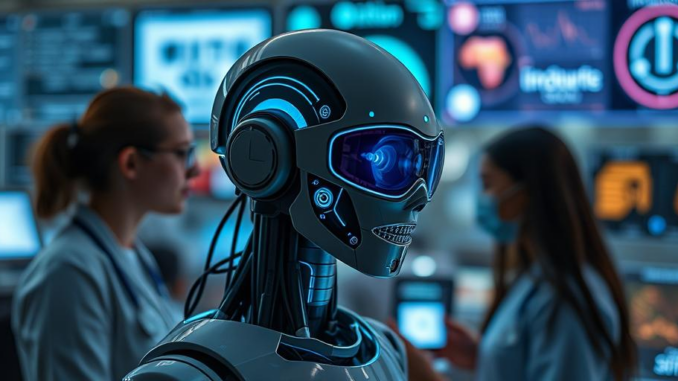
Summary
Artificial intelligence is rapidly transforming the medical device industry, leading to more efficient processes, improved diagnostics, and personalized treatments. This article explores the latest advancements in AI-driven medical devices, their benefits, and the challenges they present. From streamlining operations to enhancing patient care, AI is poised to revolutionize healthcare as we know it.
Safeguard patient information with TrueNASs self-healing data technology.
** Main Story**
AI’s not just science fiction anymore, it’s really changing the game in medical devices. Think about it, AI-powered tools are making diagnostics sharper, treatments more personal, and, most importantly, improving how patients get better. It’s all happening faster than I think most people realize.
How AI’s Shaking Up Healthcare
AI’s finding its way into all sorts of medical applications. Here’s a quick rundown:
-
Smarter Diagnostics: AI can analyze X-rays, CT scans, MRIs, you name it, faster and often more accurately than a human. I remember reading about this study where AI detected early-stage lung cancer in scans that radiologists had missed. Pretty impressive, right? It’s like having a super-powered second opinion, and leads to earlier diagnoses, that’s the important thing.
-
Tailored Treatments: Imagine a treatment plan designed just for you. AI can make that a reality by crunching your medical history, genetics, even lifestyle, to create a hyper-personalized approach. It’s not just about finding the right drug; it’s about finding the right drug for you.
-
Faster Drug Discovery: Developing new drugs takes years and costs a fortune. AI can speed things up by sifting through mountains of data to pinpoint potential drug candidates and predict how they’ll interact. It is actually incredible how much time and money can be saved with such a tool, and it’s really driving medical innovation.
-
Remote Patient Monitoring: Wearable devices armed with AI can keep tabs on patients from afar, tracking vital signs, symptoms, and activity. This is great for managing chronic conditions and catching potential problems early. Think of it as having a virtual nurse watching over you 24/7, but it can also be a privacy minefield. More on that later.
-
Smoother Operations: Hospitals can be chaotic. AI can help streamline things by automating administrative tasks, scheduling operating rooms, and managing resources more efficiently. This frees up doctors and nurses to focus on what matters most: taking care of patients.
What’s So Great About AI Medical Devices?
So, why is everyone so excited about AI in medicine? Here’s a quick recap:
-
Better Accuracy: AI can spot things that humans might miss, leading to more reliable diagnoses. This is crucial when dealing with complex conditions or subtle anomalies.
-
Quicker Results: Nobody wants to wait weeks for test results. AI can analyze data in a fraction of the time it takes a human, speeding up diagnosis and treatment planning.
-
Personalized Care: One size doesn’t fit all. AI tailors treatment plans to individual needs, maximizing effectiveness and minimizing side effects. I think this is where AI truly shines, it’s not just about improving generic care, it is about improving individual care.
-
More Efficiency: AI automates tasks and streamlines workflows, making healthcare more efficient. This can translate to shorter wait times, reduced costs, and better overall patient experience.
-
Cost-Effective: Yes, the initial investment can be hefty, but AI-driven devices can ultimately save money by reducing hospital readmissions and optimizing resource allocation. I think hospitals need to invest in the right technologies, this will save them money in the long run.
But It’s Not All Sunshine and Rainbows
Of course, there are challenges to consider:
-
Data Privacy: AI thrives on data, and medical data is some of the most sensitive out there. We need to make sure patient information is protected with robust security measures, and that data breaches are non-existent.
-
Regulatory Issues: The rules governing AI-driven medical devices are still evolving. Manufacturers need to navigate a complex approval process to ensure their devices are safe and effective.
-
Ethical Questions: What happens when an AI makes a mistake? How do we ensure algorithms aren’t biased? Who’s responsible when things go wrong? These are important ethical questions we need to answer. I think transparency and human oversight are key.
-
Adoption Challenges: Integrating AI into existing healthcare systems isn’t always easy. Clinicians need training to use these new technologies, and different systems need to be able to talk to each other, but they aren’t always compatible.
Looking Ahead
AI is only going to become more prevalent in medical devices as the technology advances. We can expect even more sophisticated tools that further enhance diagnostics, personalize treatments, and improve patient outcomes. It’s an exciting time, but we need to proceed cautiously, addressing the challenges and ethical considerations along the way. The future of healthcare is definitely linked to AI, and it’s important to make sure we get it right.


AI spotting things humans miss? Are we sure it’s not just judging our handwriting on prescriptions? Maybe AI ethics should include mandatory doctor handwriting classes, just in case.
That’s a hilarious point about AI and doctor handwriting! It highlights the importance of considering all potential biases in AI applications. Perhaps AI could even be used to *translate* handwriting into legible text for prescriptions, adding another layer of safety and accuracy. Great food for thought!
Editor: MedTechNews.Uk
Thank you to our Sponsor Esdebe